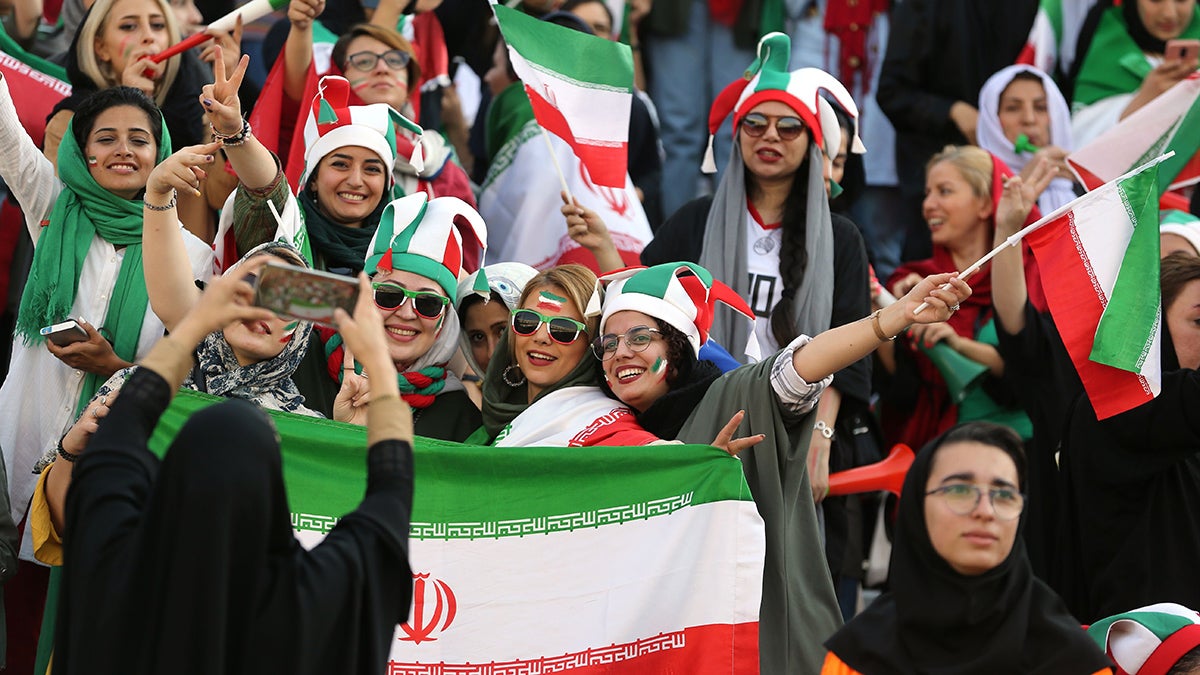Iranian women celebrate chance to cheer on national team

For more than 40 years Iranian female soccer fans were banned from attending sporting in their country, but that changed on October 10 amid growing pressure from international soccer officials and human-rights organizations.

In a historic event, Iran’s national team took on Cambodia in front of an excited home crowd of men and women and ended with a 14-0 thumping of the visiting Cambodian team.
Whether the Iranians had won or lost, the game marked a turning point for Iranian women, whose rights have been limited for decades.
After Iran’s Islamic Revolution in 1979, the country banned women from sports stadiums, an unwritten policy that was highly criticized by human-rights organizations around the world. However, under mounting pressure from FIFA, international soccer’s governing body, Iran finally agreed to permit women to enter stadiums starting with the Iran-Cambodia match.
"This is a very positive step forward, and one which FIFA, and especially Iranian girls and women, have been eagerly waiting for," FIFA President Gianni Infantino told CNN. "The passion, joy and enthusiasm they showed today was remarkable to see and encourages us even more to continue the path we have started.”
While the match was a big step in the right direction, there is still more to be done. Iran placed a cap on the number of women admitted to the match.
Iran allocated 4,000 tickets for women in a stadium that seats about 80,000 people, separated them from men and kept them under the protection of female police officers. According to USA Today, most of the stadium was empty – except for the 4,000 women, who chanted and cheered throughout the match.
Still, the women who got a ticket were thrilled to finally see their team play.
“We are so happy that finally we got the chance to go to the stadium. It’s an extraordinary feeling,” Zahra Pashaei, 29, a nurse who has seen soccer games only on television, told USA Today. “At least for me, 22 or 23 years of longing and regret lies behind this.”
With a 5% quota placed on tickets available to women, Human Rights Watch (HRW) called the cap "discriminatory, deceptive, and dangerous."
“Further details on the next steps to be implemented to ensure the future access of women to the stadiums in Iran will follow once we have performed a thorough assessment of Thursday's match based on the input provided by the FIFA delegation that is present in Tehran, Infantino told CNN.
A turning point came with the death of soccer fan Sahar Khodayari, an Iranian woman who tried to sneak into a match. She was arrested and later killed herself, spurring FIFA to push Iran into a change.
“What happened to Sahar Khodayari is heart-breaking and exposes the impact of the Iranian authorities’ appalling contempt for women’s rights in the country,” Phillip Luther, Amnesty International’s Middle East and North Africa Research and Advocacy Director, said. “Her only ‘crime’ was being a woman in a country where women face discrimination that is entrenched in law and plays out in the most horrific ways imaginable in every area of their lives, even sports.”
Some 4,000 flag-waving Iranian women cheered on Iran’s national team in a Tehran stadium on Thursday for a 2022 World Cup qualifier. Progress? ... here are my thoughts | https://t.co/P0bkRvgatv
— Andy Clayton (@aclayton33) October 10, 2019
Khodayari set herself on fire and died in September 2019 after she was caught dressing like a man in an attempt to get into a stadium to watch her favorite team play. In the wake of Khodayari’s death, FIFA labeled the stadium ban “unacceptable” and demanded that it be lifted.
When she was arrested In March 2019, Khodayari was wearing a wig and coat in an attempt to disguise herself as a male fan. She was charged with committing a “sinful act,” because she appeared in public without her hijab.
Facing a potential six months in jail if convicted of the violation, Khodayari doused herself with gasoline and set herself on fire outside the courthouse.
“FIFA convey our condolences to the family and friends of Sahar and reiterate our calls on the Iranian authorities to ensure the freedom and safety of any women engaged in this legitimate fight to end the stadium ban for women in Iran,” FIFA said in a statement released in response to Khodayari’s suicide.
While the death received little to no coverage by Iran’s state-censored media, news of the incident quickly spread around the globe.
A.S. Roma, an Italian football club, released a statement saying that “the beautiful game is meant to unite us, not divide us.”
Masoud Shojaei, captain of Iran’s men’s national team posted on Instagram that the ban “is rooted in outdated and cringe-worthy thoughts that will not be understood by future generations.”
John LeVally is a senior sports journalism major at Arizona State University
Related Articles
FIFA says Iran will allow women to attend World Cup qualifier
#Bluegirl’s death launches global protests against Iran’s stadium ban
Iran censors soccer broadcast due to female referee’s attire
Inequality, corruption continue to hamper women’s football globally

